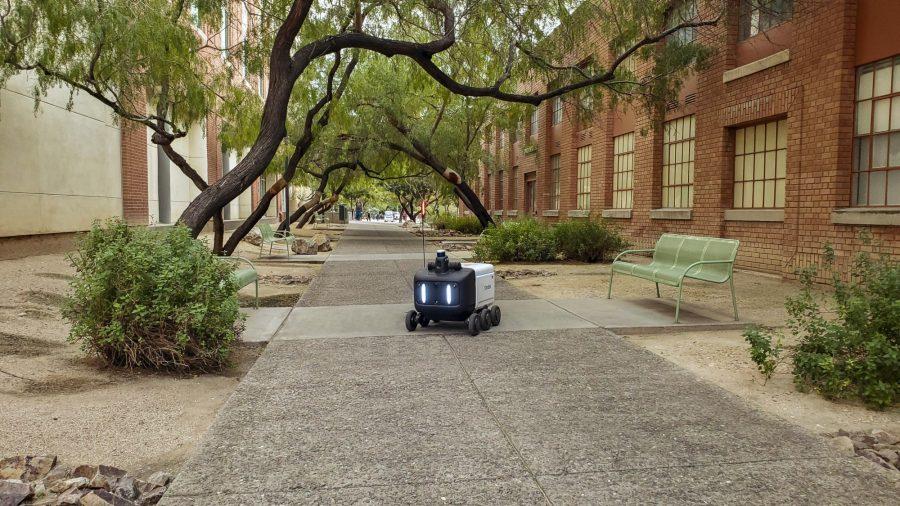They came on a Wednesday, and they came in peace.
Nov. 17, 2021, marked the introduction of Yandex food delivery robots to the University of Arizona campus. They were an instant cultural phenomenon.
Students couldn’t help staring at the robots as they rode past, some even stopping the automatons in their tracks by jumping in their path.
“We can see huge interest from students. The most frequent thing we’re facing on campuses is that students want to take pictures with them. They also like to challenge the robot to see what happens if they stand in front of it. So student curiosity is really amazing, and I think they’re excited about these robots,” Yandex Head of Public Relations Yulia Shveyko told the Wildcat in a previous article.
The UA became the second university in the nation to partner with Yandex and Grubhub to provide an alternative method of delivering food to hungry college students. While the robots helped alleviate the volume of orders for delivery, it appeared as though the burden was passed on to restaurant workers dealing with more orders.
Thomas Najor is a junior economics student and worked at Einstein’s Bagels at the Student Union Memorial Center while the Yandex robots were still delivering. Najor said that delivery orders from the robots piled onto the existing amount of orders Einstein workers had to handle, which could become overwhelming.
“On the one hand, I really enjoy working with them as the guy dropping off the orders,” Najor said. “I’d say the more difficult part of working with them is on the line itself because we get all of the orders at the same time. So, we’ll get in-store orders at the same time as pickup, which is already from Grubhub, and then on top of it we’ll have the deliveries from actual Grubhub deliverers and then the robots.”
Najor estimated based on his own experience that robot usage had substantially grown since their implementation in November.
“Really within the last two months, we’ve gone from doing six a day to probably doing, like, at least a hundred,” Najor said.
The robots left more than just an economic footprint at the UA. In some students, an emotional bond was forged.
“It’s fun to see them around here,” said Ananya Shah, a freshman biology student. “They’re cute.”
Another attractive aspect of the robots was their convenience.
“Anytime they offer, I honestly prefer [the robots],” said Katey Smith, a freshman and pre-business student at the Eller College of Management. “I just, half the time, don’t like talking to people when I do order delivery food. I like them a lot, honestly, it makes it so much easier.”
Others developed an unexplainable aversion to the large white cubes rolling along the sidewalk and the sympathy expressed to them.
“I think it’s just weird, sort of like sympathizing with a machine and calling it cute,” said Ian McArthur, a freshman studying architectural engineering and self-proclaimed anti-botter. “Something about it just rubs me the wrong way, and it’s just like, ‘no, this is a metal box that is rolling in my way on the sidewalk.’”
McArthur was a member of a UA-based Discord server that engages in Yandex discourse. Members of the server are generally separated into two camps: pro-bot and anti-bot.
RELATED: Representative Paul Gosar talks at College Republicans United event on campus
Objections to the robots also extended to their potentially harmful social and political implications.
“They’re machines created by a mindless mega-corporation run by Russian oligarchs to take away jobs from honest workers who may be getting underpaid but being underpaid is better than the job literally not existing, which is what they’re trying to do. We keep supporting things like Yandex without really talking about the ethical and societal considerations,” said Zane Landers, another outspoken anti-botter on the Discord server.
“I totally agree with the sentiment, but I am pro-bot because I think that we can do the food delivery system with the adorable robots in an ethical way,” said Farida Baouab, a sophomore psychology student who is also a member of the Discord. “It’s just the system needs to be changed. So, the problem is not the robots. It’s the system in which they work.”
As it happened, the anti-botters would have their way.
The Yandex food delivery robots ceased operation from campus on March 3 due to the ongoing war in Ukraine.
“Due to the invasion of Ukraine by Russia, Arizona Student Unions and Arizona Dining will cease doing business with Yandex, a Russian multi-national public traded company and the hardware provider of the robot couriers on campus, as of today, March 3, 2022,” the Arizona Student Unions wrote in an Instagram post.
The robots are survived by the “Yandexposting” Discord server.
Follow Kristijan Barnjak on Twitter









